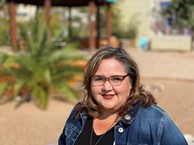
By Mila Besich
Education has always been a priority for my family, and it was a frequent topic of discussion growing up. With my own children, the conversation continued. As the daughter and granddaughter of miners, attaining a college education was a fervent goal for my entire family, myself included.
Four generations of our family graduated from Superior High School, and while the college/career path varied for each generation as the years progressed, one thing remained constant – lifelong learning would always be a priority. Regrettably, this is not always a common conversation for every Arizona family.
Accessing a college education was not easy, and significant sacrifices were made to do so. In earlier generations, working summers at the mine in Superior provided sufficient financial resources to make college affordable and accessible.
For my children, the Promise for the Future program for Pinal County graduates afforded them an opportunity to begin their college education at Central Arizona College and both have transferred to Arizona State University to pursue their bachelor’s degrees. Pinal County’s Promise for the Future program has helped reduce the burdens and struggles that many families face when making decisions about college, but once they complete a two-year program, there are often not as many options to continue onto a bachelor’s or graduate degree.
It is time that a program such as Promise for the Future is available across the state of Arizona. The Arizona Promise Program (SB 1508) would create a scholarship program to provide access to higher education for low-income families across our state by covering tuition and fees at Arizona’s public universities or community colleges. The Arizona Board of Regents is making this budget request to the Arizona State Legislature as part of its New Economy Initiative.
The Town of Superior has included lifelong learning, access to higher education and job/skills training as critical priorities in our economic development strategy. The Superior Junior/Senior High school maintains a higher than average graduation rate. The class of 2018 from Superior had a 96.7 percent graduation rate, but despite the high graduation rate, only 7.4 percent went on to attend a four-year university. The low college attainment will eventually affect our local workforce development. Looking back to the Superior Junior/Senior High School class of 2013, only 11.7 percent of those graduates completed a four-year degree program compared to 22.4 percent statewide. For many of the families in our community, making the financial commitment to attend college is the number one deterrent.
The challenges that low-income students face to attend college will eventually have a devastating ripple effect on our statewide workforce development and severely limit Arizona’s ability to remain competitive. We will be forced to recruit workers into Arizona and worse yet, we most assuredly can lose opportunities to retain and expand existing employers and to attract other companies to our state as well.
With additional and sufficient state support, Arizona’s public universities can boost access and the number of Arizona resident students who earn a degree, while growing research and development for an economy increasingly built on knowledge and discovery. Our universities in Arizona are poised to lead Arizona into the New Economy, but we must invest now.
Developing the Arizona Promise Program will significantly reduce the burdens many Arizona families face when determining if their children can attend college. The Arizona Promise scholarship will ensure that Arizona residents who graduated from high school with a minimum 2.5 GPA, qualify for the free or reduced lunch program and completed the FAFSA application will be eligible for this scholarship.
What will happen if we were to approve this Arizona Promise? Our economy across the state would continue to flourish, and more residents of Arizona would be qualified for these New Economy jobs, where they will earn higher wages and enjoy a higher quality of life. Higher education attainment also leads to an increased tax base for the state. States that have enacted promise programs have seen tangible benefits in the way students view college and their place in it. Why wouldn’t we want to make this promise?
It is time that we place our focus on making and keeping a promise of the opportunity for lifetime success for every resident of Arizona. Access to higher education will keep Arizona in the lead. Let’s promise success to everyone and enact the Arizona Promise Scholarship program.
Mila Besich is the Mayor of Superior, Ariz. She also serves as the executive director of the Copper Corridor Economic Development Coalition.
